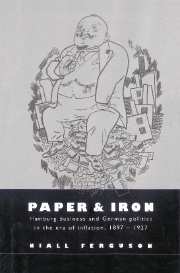Book contents
- Frontmatter
- Contents
- List of figures
- Preface
- List of abbreviations
- Introduction
- 1 Golden years
- 2 The sinews of war
- 3 The political economy of revolution
- 4 Versailles and Hamburg
- 5 Relative stabilisation
- 6 The failure of ‘fulfilment’
- 7 Dissolution and liquidation
- 8 The legacy of the inflation
- Epilogue: Hitler's inflation
- Appendix
- Bibliography
- Index
3 - The political economy of revolution
Published online by Cambridge University Press: 14 October 2009
- Frontmatter
- Contents
- List of figures
- Preface
- List of abbreviations
- Introduction
- 1 Golden years
- 2 The sinews of war
- 3 The political economy of revolution
- 4 Versailles and Hamburg
- 5 Relative stabilisation
- 6 The failure of ‘fulfilment’
- 7 Dissolution and liquidation
- 8 The legacy of the inflation
- Epilogue: Hitler's inflation
- Appendix
- Bibliography
- Index
Summary
A bourgeois revolution?
In 1914, Bethmann Hollweg had predicted that war might ‘topple many a throne’. Beginning in February 1917 in Petrograd, his prophecy was fulfilled. Military failure and economic exhaustion precipitated a crisis of urban order, sweeping eastwards from the Russian capital to Vienna, Budapest and Berlin. The upheavals sufficed to despatch the defeated Eastern Empires – Tsarist Russia, Habsburg Austria-Hungary, Hohenzollern Germany and Ottoman Turkey; indeed, even the victorious Western states underwent substantial political alterations, including democratisation and Southern Irish secession in Britain. In this sense, there was a generalised European Revolution between 1917 and 1919, in which economic, pacifist, democratic, socialist and nationalist aspirations all played a part. However, the point which has traditionally preoccupied historians is that only in one country – Russia – was a radically socialist dictatorship established. Whereas in Russia, a high degree of ‘social polarisation’ could be exploited by a small but adaptable party claiming to represent the proletariat, elsewhere ‘bourgeois Europe’ was ‘recast’, whether by corporatist compromise (Germany, Austria and Poland), conservative containment (Britain and France), ‘white’ reaction (Hungary) or fascist counter-revolution (Italy). In view of this contrast with events in Russia, German historians have long debated whether the Social Democrats were right to compromise with the military, industrial and administrative elites in order (as they argued) to avert ‘Bolshevik chaos’; or whether an opportunity was missed in 1918/19 to transform German society and politics by using the democratic potential of the ‘councils movement’ to dilute the power of those ‘anti-democratic’ elites whose continued existence – arguably – proved fatal to the Republic.
- Type
- Chapter
- Information
- Paper and IronHamburg Business and German Politics in the Era of Inflation, 1897–1927, pp. 152 - 197Publisher: Cambridge University PressPrint publication year: 1995



